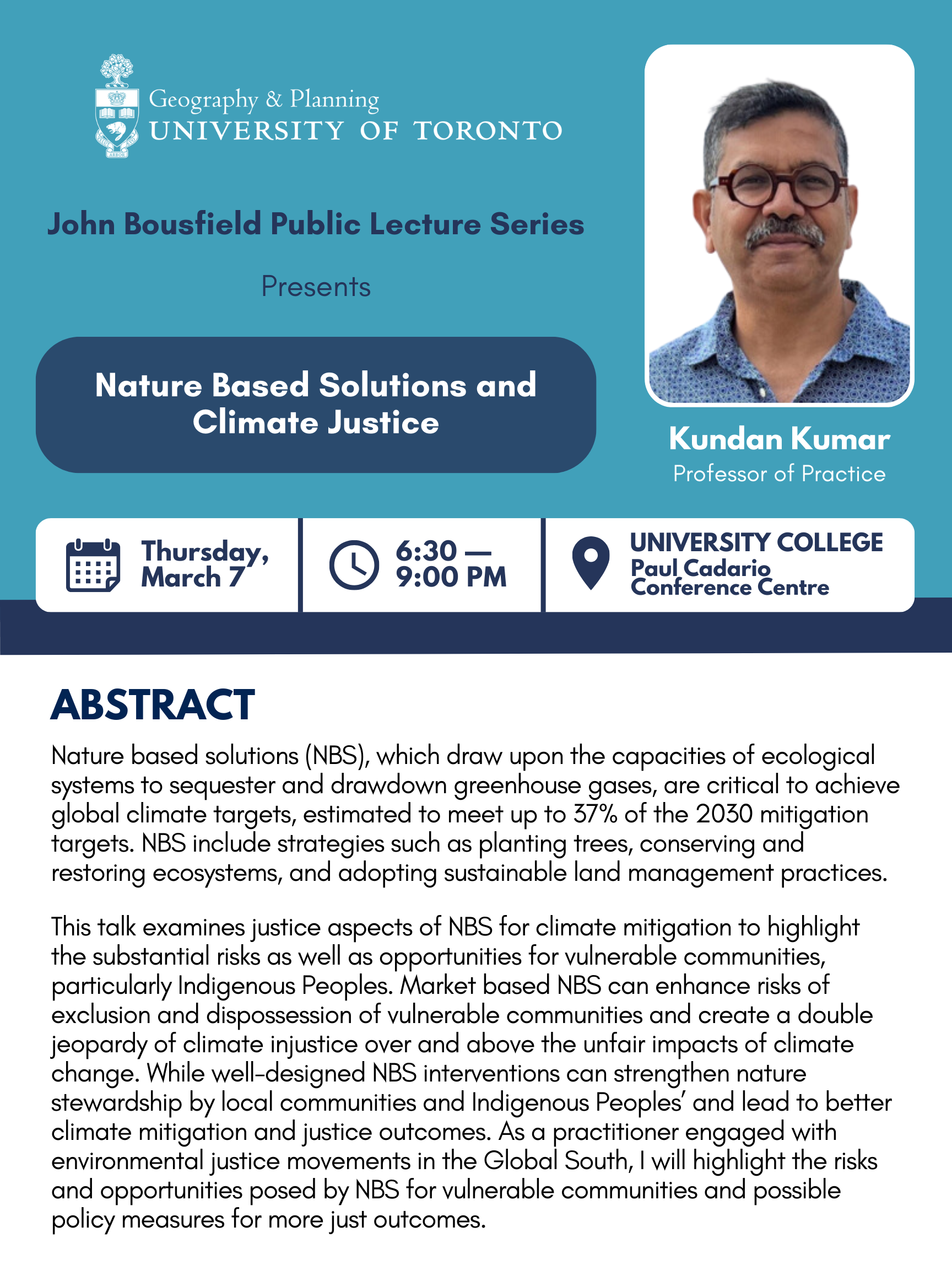John Bousfield Public Lecture Series: Nature Based Solutions and Climate Justice
When and Where
Thursday, March 07, 2024 6:30 pm to 9:00 pm
Paul Cadario Conference Centre
University College
15 King's College Circle, Toronto, ON M5S 3H7
Speakers
Kundan Kumar
Description
John Bousfield Public Lecture Series: Nature Based Solutions and Climate Justice — Presented by Kundan Kumar.
Join us at the Paul Cadario Conference Centre (University College) on Thursday, March 7th from 6:30 - 9:00pm — reception with refreshments to follow discussion.
Event Abstract
Nature based solutions (NBS), which draw upon the capacities of ecological systems to sequester and drawdown greenhouse gases, are critical to achieve global climate targets, estimated to meet up to 37% of the 2030 mitigation targets. NBS include strategies such as planting trees, conserving and restoring ecosystems, and adopting sustainable land management practices.
This talk examines justice aspects of NBS for climate mitigation to highlight the substantial risks as well as opportunities for vulnerable communities, particularly Indigenous Peoples. Market based NBS can enhance risks of exclusion and dispossession of vulnerable communities and create a double jeopardy of climate injustice over and above the unfair impacts of climate change. While well-designed NBS interventions can strengthen nature stewardship by local communities and Indigenous Peoples’ and lead to better climate mitigation and justice outcomes. As a practitioner engaged with environmental justice movements in the Global South, I will highlight the risks and opportunities posed by NBS for vulnerable communities and possible policy measures for more just outcomes.
About Kundan Kumar
Kundan Kumar has worked for two and a half decades as a scholar-practitioner, activist, and advocate for environmental justice, territorial and land rights of Indigenous Peoples and other marginalised communities, and community-led conservation. Working at local to global scales, his career includes work with grassroots initiatives, experience with development banking and planning, and regional and global level engagement with land tenure issues, conservation, and climate change with a focus on equity, justice and mobilisation of marginalised peoples. He currently advises the Indigenous Unit at FAO (UN’s Food and Agricultural Organization) as a Climate and Conservation Expert, supporting the unit’s research and advocacy efforts on the importance of Indigenous Peoples’ mobilities, mobile livelihoods, and collective rights for biodiversity conservation. Prior to this, from 2014-2021 he worked with the Rights & Resources Initiative (RRI) as the Director of Asia Programs, leading RRI’s policy and grassroots interventions relating to Indigenous Peoples’ collective rights over land and forests in Asia. From 2009-2014, he worked the Department of Geography & Planning and the Faculty of Forestry at the University of Toronto as an Assistant Professor (CLTA). He completed his PhD in Resource Development from Michigan State University in 2010, after an extensive career in development banking and work with environmental justice movements in India.
Given the intertwined crisis of capitalism and planetary systems, Kundan’s recent engagement with Indigenous Peoples and other marginalised communities focuses on climate and environmental justice. Kundan has worked on how the proposed “nature-based solutions (NBS)” such as 30X30 (setting aside 30% of geographical area for conservation by 2030), net zero and other initiatives for climate mitigation threaten to create new enclosures and intensify dispossession, and marginalisation of vulnerable communities. As climate crises intensify, the risk of harm to vulnerable peoples from justice-agnostic planning for climate mitigation and adaptation are likely to increase, as heightened sense of crisis is used to undermine democracy and justice. As a Bousfield Fellow, Kundan would continue to focus on justice implications of various climate mitigation and adaptation initiatives, especially Nature-Based solutions, seeking to improve connections between practice and theory of climate and environmental justice. In addition, Kundan will work on pathways for increased attention on Climate and Environmental Justice in Planning curricula.

Map
15 King's College Circle, Toronto, ON M5S 3H7


